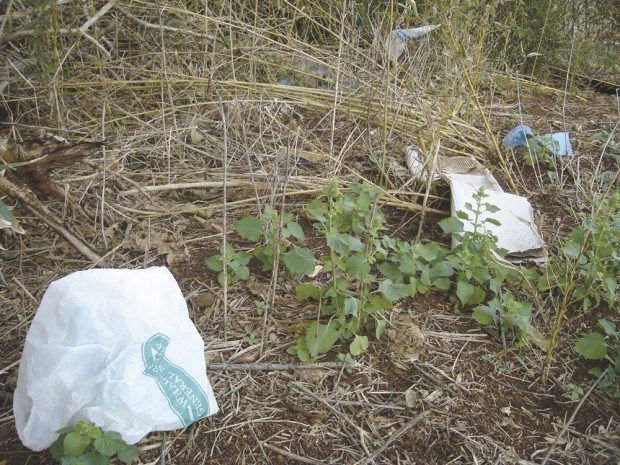LIHU‘E — Plastic bags, food containers and beer bottles lining the island’s roadways have become an eyesore against Kaua‘i’s picturesque landscape, some visitors say. Surprised by the increasing abundance of roadside rubbish, a visitor from Merrimack, N.H. recently expressed her
LIHU‘E — Plastic bags, food containers and beer bottles lining the island’s roadways have become an eyesore against Kaua‘i’s picturesque landscape, some visitors say.
Surprised by the increasing abundance of roadside rubbish, a visitor from Merrimack, N.H. recently expressed her concerns in a March 2 letter to the editor, “Just a visitor’s observation.”
“I have seen rubbish fly out of the back of many a pickup this week and no one stops to pick it up,” Maureen Adams wrote. “Is there no pride left?”
What might strike some as also surprising are the minimal efforts taken to curb the situation.
As far as state highways are concerned, the county “would be happy to discuss with the Department of Transportation” how it can help “their highway cleanup efforts,” said county spokeswoman Mary Daubert.
The county taking a leadership role in the ‘opala fight is not feasible at this time, as the county “has many other priorities that we are chartered to address first,” said Daubert.
On the other hand, during the late Mayor Bryan Baptiste’s administration, there had been “discussion” on creating an “adopt-a-road” program for county roadways. The program, however, “did not move forward due to liability issues and the lack of staff to implement and oversee such a program,” Daubert said.
The county does receive complaints about trash “being dumped along county roadways on a regular basis,” Daubert said. Most of the calls are in reference to larger items like car parts, mattresses and refrigerators.
“More recently there have been calls regarding remains of dead animals, in particular wild pigs,” she added.
The county Department of Public Works road crews do “clean the sides of county roadways on a regular basis,” Daubert said. And to discourage illegal dumping where it regularly occurs, signs are posted.
But, aside from the DOT responding to “major or hazardous” dumping and the occasional utility vehicle picking up small trash on state roads on the island, the only other clean-up currently occurring along state highways is on a voluntary basis through the “Adopt a Highway” program.
However, “not every roadway or all miles have been adopted,” said the DOT spokesperson Tammy Mori.
The county, however, has been “working proactively with members of the business community who have adopted highways to encourage regular clean-ups of their various sections of the highway,” Daubert said.
“Littering is a concern on all state roads in general,” Mori said. “It’s always been a concern for all of us. We need to keep islands clean.”
The epidemic is really a combination of individual and community responsibility, she added.
“If you change people early on, beauty can be maintained for years to come,” Mori said. Caring for the ‘aina starts with each person, she said.
“Of course, taking care of our island is very important, and while government is tasked to maintain public areas, residents must also take personal responsibility for this effort,” Daubert said.
“Hopefully when the plastic ban bill goes into effect in January it will help reduce some of the litter along our roadways and in our waterways,” said Daubert.
• Coco Zickos, business and environmental writer, can be reached at 245-3681 (ext. 251) or czickos@kauaipubco.com.


